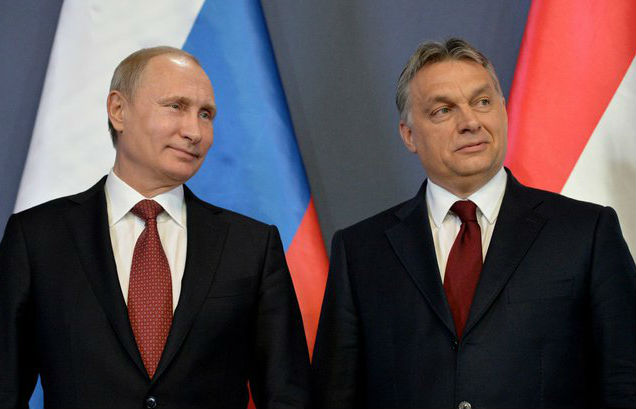 As the Greek tragedy unfolds, many Europeans seem to have forgotten that for the first time since the end of World War II, a country is trying to redraw European borders by force. Russia’s annexation of Crimea and its support for rebels in eastern Ukraine is, by far, Europe’s most serious security crisis since the Balkan wars. Once again, we are reminded of what happens when autocrats think they can act unchallenged.
As the Greek tragedy unfolds, many Europeans seem to have forgotten that for the first time since the end of World War II, a country is trying to redraw European borders by force. Russia’s annexation of Crimea and its support for rebels in eastern Ukraine is, by far, Europe’s most serious security crisis since the Balkan wars. Once again, we are reminded of what happens when autocrats think they can act unchallenged.
Ukraine’s situation is dire, but things don’t look too good for Russia either. So far, Moscow’s increased support of the rebels has only elicited tougher sanctions from the European Union, crippling the Russian economy. But there’s a weak link: maintaining and perhaps strengthening the sanctions when necessary requires consensus among EU member states. This is why Russia is scheming to make some EU countries weary of this “economic war” even before Europe has fully recovered from the economic crisis, and jump ship.
Who should the Kremlin target first? One obvious candidate is Germany – one of Russia’s main trading partners. The Germans import almost a third of their gas from Russia and last year, several major German companies tried to dissuade the government from imposing new sanctions. For economic and historical reasons, Germany has preferred carrots to sticks when dealing with Russia, but things seem to have changed. At the EU summit in March, Germany and Sweden pushed to extend the sanctions. Perhaps we can attribute this to German Chancellor Angela Merkel’s East German background; she simply knows who and what she is dealing with.
Both Greece and Cyprus opposed anti-Russia sanctions at the last summit. In the Greek case, this may have been a negotiating tactic with the creditors, an attempt to portray Russia as an alternative source of cash. Only hours after Greece’s July 5 referendum, reports emerged of contacts between Russian President Vladimir Putin and Greek Prime Minister Alexis Tsipras. But nothing indicates that Russia, with its own economic difficulties, is prepared to help pay off the massive Greek debt.
Before it had its own banking crisis, Cyprus was a favorite place for Russian oligarchs to park their laundered cash. But most of that money is now gone, and as long as the sanctions are there, it won’t be coming back.
Another obvious candidate is Hungary, whose Prime Minister, Viktor Orbán, has become one of Putin’s strongest allies in the EU. Like many Eastern European countries, Hungary imports gas from Russia and there are political ties as well. Orbán’s ruling Fidesz party has transformed itself from a liberal party to a strongly socially conservative one. In July 2014, months before the Ukrainian crisis, Orbán said he wanted to abandon liberal democracy in favor of an “illiberal state,” citing Russia as an example.
Then there is Finland, also a major trading partner of Russia. After Finland’s recent election, Timo Soini, leader of the populist anti-EU Finns Party became foreign minister. The Finns Party has often claimed that any further sanctions will disproportionally hurt Finnish business.
Meanwhile in Russia, the patriotic euphoria followings Putin’s seizure of Crimea has cooled somewhat as living standards decline. Some independent journalists speak of “the battle between TV and refrigerator” —as the fridge gets empty, the anti-Western propaganda on state TV gets more aggressive. The question is what will Russia’s people care about in the end?
Ukraine’s hope lies in who has greater endurance. Faced with European unity, Russia is in trouble. But many European economies are still stagnant and support grows for populist parties on the left and right. Most of these parties oppose sanctions, not because they necessarily adore Putin’s Russia —although some do—but because they oppose the EU and everything associated with it.
What these movements forget—or simply don’t care about—is Russia’s ultimate goal: the “finlandization” of Western Europe in order to have a free hand in Eastern Europe. Those who think they can deter Putin by addressing some perceived historical grievances, are delusional. People who follow the Russian leader closely say that he is a tactician more than a strategist—he acts where he thinks he can and awaits a countermove. It is within the nature of a regime like his to view restraint as a sign of weakness and simply push further until the ultimate goal is achieved. Europe’s future is therefore tied to Ukraine’s. The problem is not what Russia is prepared to do, but what we are prepared to do about it. Europeans should know by now that they must not tolerate aggression from authoritarian states. In the end, the greatest threat to Ukraine—and Europe—is indifference and lack of unity.
Aaron Korewa is former political adviser to Carl Bildt, former Foreign Minister of Sweden. He lives in Stockholm.
Image: Russian President Vladimir Putin with Hungarian Prime Minister Viktor Orbán on a visit to Hungary in February 2015. Orbán has become one of Putin’s strongest allies in the EU. Credit: Kremlin.ru
